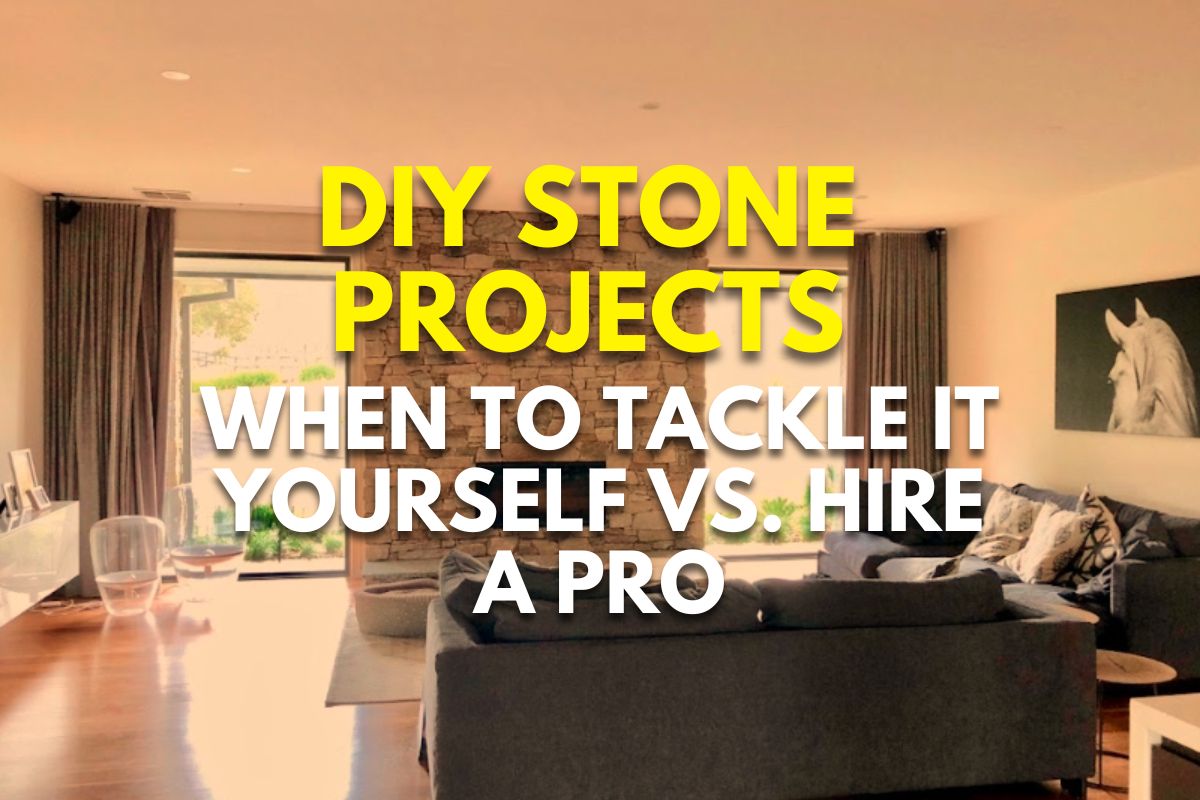
Many homeowners are tempted to take on stone projects themselves to save money, but not all tasks are suited for DIY.
Without proper skills and tools, DIY stone projects can lead to costly mistakes, subpar results, and even injuries. The challenge is knowing which projects are manageable and which require professional expertise.
This article helps you discern when a stone project is within your DIY capabilities and when hiring a professional is wise. Make informed decisions to ensure your home improvement endeavors’ quality, safety, and efficiency.
Assessing Your Skills and Resources
Assessing Your Skills
Before embarking on a DIY stone project, critically evaluate your skill level.
Have you completed similar projects before?
Understanding your experience with basic tools and construction practices is crucial. Stonework often requires precise cuts and careful assembly that may be beyond basic DIY skills.
Evaluating Available Tools
Do you have the necessary tools for stone cutting, shaping, and finishing?
Specialized equipment like wet saws and grinders are essential for handling stone. Renting can be an option but consider the costs and learning curve.
Time Availability
Consider whether you have enough time to dedicate to the project. Stone projects can be time-consuming, and rushing through the process increases the risk of mistakes.
Understanding the Scope of the Project
Evaluate the scale and complexity of the project.
Installing a stone countertop, for instance, involves more than just placement; it includes precise cutting and fitting, which might be best left to professionals.
Physical Ability
Stonework is labor-intensive and requires great physical strength and stamina. Assess whether you can physically handle the task, especially for large projects that involve moving and lifting heavy stones.
Cost Analysis
Calculate the cost of materials, tools, and any potential extras.
Sometimes, the cost difference between DIY and hiring professionals is insignificant when you factor in purchasing or renting tools and materials.
Risk Assessment
Consider the risks involved.
A failed DIY project can result in wasted materials and potential damage to your home, leading to higher costs than hiring professionals from the start.
Legal and Safety Considerations
Ensure that your project adheres to local building codes and regulations.
Also, the safety risks associated with handling heavy materials and machinery should be considered. Lack of proper technique can lead to serious injuries..
Factors Influencing the Decision
When deciding whether to DIY or hire a professional for a stone project, several key factors should be considered to ensure the decision aligns with your goals, abilities, and budget:
- Skill Level: Assess your own skill level realistically. Complex stone projects require precise measurements, specific tools, and techniques that may be beyond the average DIYer’s expertise. If the project involves more than basic installation, professional help might be necessary.
- Cost: Evaluate the cost implications of both options. While DIY projects can potentially save on labor costs, unexpected expenses can arise from mistakes or the need for specialized tools. Professionals offer a more predictable cost structure and can often negotiate better material prices due to their industry connections.
- Time Commitment: Consider how much time you can realistically dedicate to the project. Professional contractors can complete the work more quickly and efficiently due to their experience and resources.
- Project Scale and Complexity: Large-scale or complex projects, such as outdoor hardscaping or intricate tiling, usually require a professional to ensure quality and structural integrity.
- Safety: DIY projects involving heavy materials carry a risk of injury. Professional contractors have the training and equipment to handle such materials safely.
- End Result: Consider the importance of the final look and functionality. The precision and guarantee that come with professional services might be more valuable for high-stakes projects.
Weighing these factors will help you determine the most suitable approach for your stone project, balancing personal satisfaction and safety with cost and appearance.
DIY Stone Projects: When to Tackle It Yourself
Tackling a DIY stone project can be rewarding under the right circumstances. Here are scenarios when it’s appropriate to consider a DIY approach:
- Small-Scale Projects: If the project is relatively small and manageable, such as a garden pathway, a stone veneer for a feature wall, or a simple patio, DIY can be a great choice. These projects typically require fewer technical skills and are more forgiving of minor imperfections.
- Availability of Resources: You should have easy access to the necessary tools and materials. Many basic stone projects require tools such as wet saws, hammers, chisels, and mortar mixes, which can be rented or purchased reasonably. Additionally, many resources are available, including tutorials and DIY guides, that can provide step-by-step instructions.
- Previous Experience: If you have experience with similar projects or a background in a related skill set like masonry or tiling, you will likely achieve better results. Previous experience can greatly increase the chances of a successful project outcome.
- Time Flexibility: DIY projects often take longer than expected, especially with learning curves. If you have a flexible schedule and the project timeline is not pressing, the slower pace of DIY won’t be a significant issue.
- Interest and Patience: A genuine interest in the project and the patience to see it through despite potential setbacks can make DIY a more satisfying and economically sensible option. Enthusiasm for the task at hand will help maintain momentum and dedication throughout the project phases.
When these conditions align, DIY stone projects can save money and provide a profound sense of accomplishment and a personalized touch to your home.
Hiring a Pro: Situations Where It’s Best to Seek Professional Help
When undertaking stone projects, there are several scenarios where hiring a professional is not just advisable, but essential for achieving the best results:
- Complex Installations: Professional skills are crucial if the project involves complex elements like intricate patterns or the integration of various materials. Examples include fitting a stone fireplace surround or crafting a mosaic for an outdoor patio. Professionals ensure precise cuts, proper fitting, and overall aesthetic coherence.
- Structural Modifications: Professionals should handle any project requiring modifications to your home’s structure, such as installing stone surfaces that need support or adding stone features to load-bearing walls. They can address structural integrity while adhering to building codes.
- Large-Scale Projects: The scope of extensive projects, such as a complete outdoor kitchen or a full home flooring installation, can be too large for DIY. Professionals manage these large projects more efficiently, often with better results and less waste.
- Specialized Tools and Techniques: Certain types of stone treatments, such as polished marble or sculpted details, require specialized tools and expert techniques. Professionals bring the necessary equipment and experience, ensuring a high-quality finish.
- Safety Concerns: Handling heavy stone materials can be hazardous. Professional installers are trained to maneuver large slabs safely and are equipped to handle the job’s physical demands.
In these situations, the expertise of a seasoned professional ensures that the project is not only completed to a high standard but also conducted safely and in compliance with local regulations.
Finding the Right Professional
Finding the right professional for your stone project is crucial to ensure that the work is done efficiently and to high standards. Here are key steps to help you select the best expert for the job:
- Research and Recommendations: Research local contractors specializing in stone projects. Look for those with strong reputations and positive reviews. Asking for recommendations from friends, family, or local building supply stores can also lead you to reliable professionals.
- Check Credentials: Once you’ve identified potential contractors, verify their credentials. Ensure they are licensed, insured, and bonded. This protects you from liability and ensures a level of professionalism and recourse in the event of subpar work.
- Review Past Work: Ask for a portfolio of their previous projects. This gives you an insight into their craftsmanship and the variety of projects they have handled. If possible, visit finished projects to assess the quality of their work firsthand.
- Get Quotes: Obtain detailed quotes from at least three contractors. The quote should break down the cost of materials, labor, and any other expenses. This will help you compare and understand what you’re paying for, ensuring transparency.
- Interview Candidates: Finally, interview your top choices to discuss your project in detail. This conversation can reveal their communication style, commitment to timelines, and overall willingness to work with your specific needs and preferences.
Taking these steps will help you find a skilled and trustworthy professional who can bring your vision for a stone project to life with the expertise it demands.
Conclusion
Deciding between DIY and hiring a pro for your stone projects hinges on a clear assessment of your skills, resources, and the project’s demands. Carefully weigh your options to ensure the best outcome.
Ready to take the next step?
Whether it’s gathering the right tools or consulting with a professional, make the choice that guarantees quality and satisfaction in your home improvement journey.
More To Explore

Stone Accents: Adding Charm to Modern Interiors with Natural Stone
Modern interiors seek a balance of style, durability, and uniqueness. Natural stone accents are a game-changer, adding timeless elegance and character to any space. As

Natural Stone Features That Will Transform Your Living Room
Natural stone elevates any living room with elegance, texture, and timeless appeal. Its versatility allows it to enhance both modern and traditional spaces. From stone


